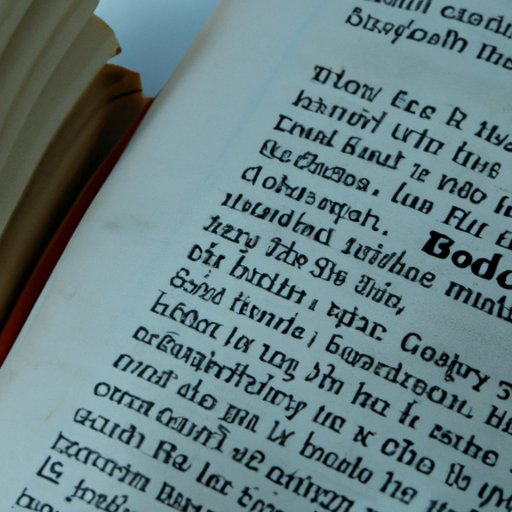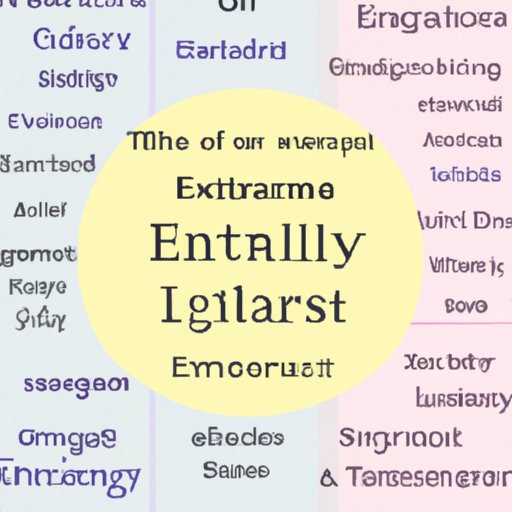Introduction
English literature is a term used to describe the written works of authors from England and all over the world who write in the English language. It is a diverse field that covers a wide range of topics, styles, and genres, and spans thousands of years of history. In this article, we will explore the history of English literature, the impact it has had on society, and its relevance in the modern age.

A Historical Overview of English Literature
English literature dates back to the 7th century in Old English works such as Beowulf, which was composed by an anonymous author. This period also saw the emergence of other significant works such as The Seafarer and The Wanderer. From these beginnings, English literature has evolved significantly over the centuries, with major literary movements emerging in the 19th and 20th centuries. Examples of these include Romanticism, which began in the late 18th century and focused on emotion and the natural world, and Modernism, which emerged in the early 20th century and explored new ways of looking at the world.

Examining the Impact of English Literature on Society
English literature has had a profound impact on society over the centuries. It has shaped culture, influenced politics, and provided insight into the human condition. For example, William Shakespeare’s plays have been performed for hundreds of years and are still widely read today. His work has made an indelible mark on the English language, introducing words and phrases that are now commonplace.
English literature has also had a major influence on politics. George Orwell’s novel Nineteen Eighty-Four, for example, served as a warning against the dangers of totalitarianism. Similarly, Mary Shelley’s Frankenstein is often used as a metaphor for man’s attempts to play God.
Analyzing Significant Themes and Symbols in English Literature
English literature is rich with themes and symbols that provide insight into the human experience. Common themes explored in English literature include love, death, the power of nature, the importance of family, and the search for identity. Many of these themes can be found in the works of great English authors such as Jane Austen, Emily Bronte, and John Milton.
Symbols are another important element of English literature. They are often used to represent ideas or emotions, and can help readers to better understand the text. Common symbols found in English literature include birds, which often symbolize freedom, and fire, which can symbolize destruction or rebirth.
Exploring Gender Representation in English Literature
Gender representation in English literature has changed significantly over time. In the 16th and 17th centuries, women were often portrayed as objects of male desire or as submissive figures. However, during the 19th century, more female authors emerged, giving voice to the experiences of women and challenging traditional gender roles. Authors such as Charlotte Bronte and George Eliot wrote about strong female characters and their struggles with societal expectations.
In modern times, gender representation in English literature is still evolving, with authors such as Chimamanda Ngozi Adichie and Zadie Smith exploring the complexities of gender and identity in their works.

Investigating the Relevance of English Literature in Modern Times
English literature remains relevant in the modern age, reflecting current social issues and providing insight into the human experience. For example, contemporary novels such as Americanah by Chimamanda Ngozi Adichie and White Teeth by Zadie Smith explore issues of race, identity, and belonging. Other authors, such as Margaret Atwood and Donna Tartt, examine the role of technology in our lives and its potential dangers.
English literature is also still being used to explore political issues. Authors such as J.K. Rowling, Salman Rushdie, and Toni Morrison have used their works to address topics such as racism, colonialism, and oppression.
Comparing Different Genres of English Literature
English literature encompasses many different genres, each with its own unique style, structure, and content. Examples of genres include poetry, drama, fiction, and non-fiction. Poetry is one of the oldest forms of literature and often explores themes such as love, loss, and nature. Drama is usually written in the form of plays and often focuses on conflicts between characters. Fiction is a genre of imaginative writing, while non-fiction is based on facts and real events.
Each genre has its own particular features, and it is important to consider these when analyzing a text. For example, fiction often uses symbolism and metaphor to convey meaning, while drama uses dialogue and action to tell a story.
Conclusion
English literature has been a source of knowledge and inspiration for centuries. It has shaped culture, influenced politics, and explored the complexities of the human experience. Through its exploration of common themes and symbols, it has provided insight into the human condition. In modern times, English literature remains relevant, reflecting current social issues and providing a window into the past. From its humble beginnings in Old English works to its evolution into different genres, English literature continues to captivate readers.
In conclusion, English literature is a vast and complex field that has had a profound impact on society. It is a testament to the power of the written word and its ability to provide insight, provoke thought, and inspire change.
(Note: Is this article not meeting your expectations? Do you have knowledge or insights to share? Unlock new opportunities and expand your reach by joining our authors team. Click Registration to join us and share your expertise with our readers.)
